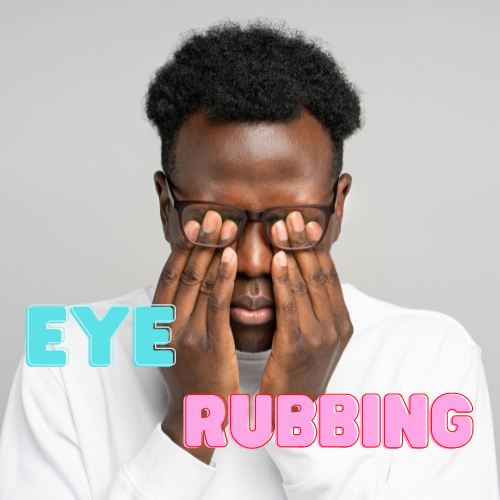Eye Rubbing – What You Should Know


It can be a relief to rub your eyes. Eye rubbing can stimulate tear flow that lubricates the eye and pressing down on the eyeball stimulates the vagus nerve which feels relaxing because it decreases your heart rate. So, clearly occasionally eye rubbing can be beneficial, but chronic, excessive eye rubbing can be harmful.
Corneal damage
Rubbing your eyes too hard or too frequently might damage your cornea or the lens of your eye. If eye rubbing is a habit and the eyes are rubbed vigorously, over a prolonged period of time it can lead to thinning of the cornea. There is also the risk that rubbing the eyes vigorously might cause tiny scratches on the cornea caused by flecks of dust or makeup that gets repeatedly rubbed across the cornea.
Your eyes don’t often feel the tiny abrasions that are caused when microparticles are rubbed back and forth over the eyes. If the eye rubbing is chronic these tiny abrasions can accumulate. An abraded (scratched) cornea may cause your eye to water and become red and sensitive to light. If the damage becomes worse the cornea can become infected or develop scar tissue.
Infection
Hands carry lots of microbes (bacteria, viruses, fungus) and eye rubbing introduces those microbes near the surface of the eyes. Some of the most common bacterial infections that occur from hand-to-eye contamination result from staphylococcus, streptococcus, salmonella, and E. coli. Try to always wash your hands before rubbing your eyes.
Can worsen glaucoma
Rubbing your eyes when your eye pressure is already heightened can cause optic nerve damage and worsen your sight.
This happens because eye rubbing tends to cause a spike in the intraocular pressure and most of the time this is harmless because the spike only lasts a few seconds. But if you rub your eyes vigorously for more than a minute and do that frequently, more than once a day, it could cause issues.
Stop rubbing your eyes
Keep your eyes moist and sufficiently hydrated by using artificial tears. If you have allergies that cause itchy eyes use an antihistamine eye drop. When your eyes feel uncomfortable, place cold packs or a warm moist washcloth on them instead of rubbing them. Find out which is more soothing to your eyes—a cold pack or moist warm washcloths.
Some of the most common causes of constant eye rubbing include:
- Allergies
- Sleep disturbances or insomnia
- Contact lens irritation
- Vision issues that need correction
- Wrong vision prescription
- Dry eye
- Blepharitis (infected or irritated eyelids, styes)
- Having a cold or flu
If you are excessively rubbing your eyes, make an appointment with your eye care practitioner to find out the underlying cause and get the treatment you need.
Gregory Scimeca, M.D.
Ophthalmologist and Medical Director
The Eye Professionals
Our Locations
